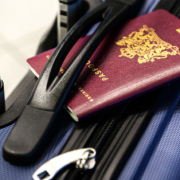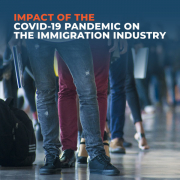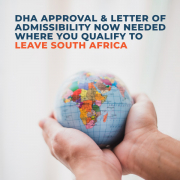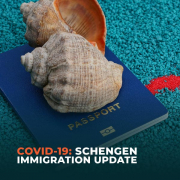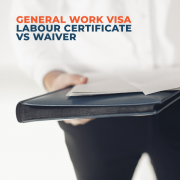NEWS | THE IMPACT OF THE COVID-19 PANDEMIC ON THE IMMIGRATION INDUSTRY
/in Archived, News /by xp-adminTarissa Wareley, an Immigration Specialist at Xpatweb, says some of the issues the Africa Permit Impact Survey aims to measure how many people are grounded either in or outside an African country that they work in due to the pandemic, which market sectors have been impacted the most, and how the government immigration departments of various African countries are affected by increased or reduced VISA and work permit applications.
“Many people have found themselves stuck either in an African country or outside the relevant African country they need to be in for work, either with or without current employment and with visas and passports that are about to expire. The most pressing need is to find out how many international workers are affected across Africa. The intention is to provide this information to the government so that they can prepare for a potential influx of applications once travel restrictions lift,” says Wareley.
Preparing for a spike in work permit and visa applications
The survey is being distributed to multi-national companies with operations in Africa who specifically employ overseas workers for both short and long term assignments.
“Once the survey is complete, we could potentially show different countries’ immigration departments what type of spike in work permit and visa applications they can expect. Xpatweb hopes to help these departments find a way to streamline these applications and get people into the countries they need to be in for work as efficiently as possible,” says Wareley.
Wareley says some African countries’ immigration services are still open, with many of them still processing work permits but not visas. The processing time of these applications remains very slow due to Covid 19. However, Wareley’s team anticipate receiving an outcome as soon as the Immigration Authorities resume their activities in full.
“Many countries still offer limited immigration services. Work permits, which are needed before a visa application can be done, can be completed in most countries during the lockdown. With this first step complete, workers’ visa applications can be processed as soon as restrictions lift,” says Wareley.
Companies urged to be proactive about employee worker and visa applications
For many foreign workers, work permit and visa applications are often a rushed administrative task that happens at the last minute. Wareley says companies will have to be more proactive about applications to avoid bottlenecks that will likely exist at many immigration departments after lockdown. She also added that, she highly recommends for all the paperwork to be prepared whilst waiting for the travel restrictions to be lifted. This will allow us to be amongst the first applicants after lockdown.
“Many African infrastructure projects, such as those in the oil and gas sector, for example, have been put on hold due to Covid-19. Making sure that companies have the right people to get projects back up and running as soon as possible is a top priority for both the public and private sectors.
A proactive approach will ensure companies who employ internationally and their staff avoid waiting and headaches down the line. Apply for work permits and visas well in advance so that people are allowed to enter the country as quickly as possible,” concludes Wareley.
AUTHOR 
Tarissa Wareley
Immigration Specialist
NEWS | DO YOU REQUIRE A LETTER OF ADMISSIBILITY TO LEAVE SOUTH AFRICA?
/in Archived, News /by xp-adminThe good news is that, in some countries, the Immigration Authorities are allowing residents, work permit holders and foreign spouses to travel back and execute their duties and to reunite with their families provided that they have all the requirements in order.
Our team has discussed with the Immigration Authorities for various countries on the requirements to enter on this basis and has received positive feedback from the relevant officials who are willing to provide letters of admissibility to allow entry for the above categories.
We confirm that, our team have already successfully assisted applicants to obtain letters of admissibility to enter the below countries:
Zambia
Tanzania
Namibia
Zimbabwe
Croatia
Cyprus
Sweden
Germany
Italy
Australia
United Kingdom
Singapore
South Korea
UAE
Saudi Arabia
NEWS | COVID-19: SCHENGEN IMMIGRATION UPDATE FOR SEAFARERS AND SUPERYACHT CREW
/in Archived, News /by xp-adminImpact on Schengen Visas and Immigration
The impact has not only been felt by seafarers but on how Europe functions as a society. Immigration has come to a standstill with a lot of uncertainty arising around existing visas and ongoing visa applications.
Specifically, COVID-19 restrictions in Europe impacted procedures to apply for and obtain residence and work permits, as government offices reduced their services or closed during the past few months. Moreover, economic uncertainty related to the pandemic may have an impact on the demand for work permits.
However, the Immigration Authorities in most European countries advised that all visas or permits that expired or are expiring during lockdown will be extended until further notice from the relevant governments.
Securing Your Home Port – Embassy Update
Visa application centres across the board remain closed due to the COVID-19 pandemic. However, those who can extend their status in a country are encouraged to lodge their applications as soon as possible to avoid the foreseeable backlog and wait for an available appointment when the application centres re-open.
Please note that one’s immigration status will not be negatively affected as a result of them not being able to attend an appointment. The extensions dates, however, will be confirmed by government which may vary depending on the country.
Foreign embassies and missions are currently closed until further notice. However, depending on the country, the embassy and consulate may be reached by telephone or email.
What Next for Seafarers Grounded Ashore with Valid Visas
Across Europe, lockdown measures are now being lifted cautiously in phases. As part of these phases, businesses in Europe and the education section were one of the first to reopen and resume. Other restrictions have been relaxed, and people are now able to travel for longer distances, as well as visit their relatives in small numbers. Travel between regions and to and from each country will be allowed from the first week of June.
Holders of work and residence permits in Schengen areas might be allowed to leave their home country to resume their work duties or for family reunification purposes, however, there is a special application process to complete prior making travel plans. This differs depending on the destination.
Navigating the Storm – Seafarers Waiting for Visas to Travel to the Schengen Area
Obtaining a seaman visa for a Schengen area under normal circumstances is already an administrative burden and a complex process. Seafarers are required to submit their Schengen visas prior their departure to the Schengen area and oftentimes, having a valid Schengen Visa is a pre-requisite to securing employment onboard vessels.
As such, it is strongly recommended that you utilise this time in lockdown to prepare your visa application whilst you await the reopening of visa application centres. In addition, applicants who provided their biometrics in the last 5 years do not have to be present when submitting their applications and may qualify for a longer duration validity visa depending on their visa history in the Schengen Visa zones.
We recommend you have a worthy visa specialist at your side when dealing with a seaman visa application, as they can ensure you fully meet all requirements and help you avoid common pitfalls that lead to a rejected visa.
NEWS | GENERAL WORK VISA: LABOUR CERTIFICATE VS WAIVER
/in Archived, News /by xp-adminThe amendment of the Immigration Act in 2014, saw the introduction of a DoL Certificate as a necessary prescribed requirement for a General Work Visa application and subsequent renewal applications, which has caused many disappointments for foreigners and their future South African employers.
Since the introduction of the certification from the DoL, applicants and South African employers have been opting for a lesser known means, offered by the Department of Home Affairs (“DHA”), to surpass such a certification, and especially where urgent project work is required, by applying for a waiver letter to the DHA in order to substitute the DoL Certificate.
Accordingly, and in terms of section 31(2)(c) of the Immigration Act, the Minister may, for good cause, waive any prescribed requirement or form. A waiver (application) is a formal written request to the DHA to set aside certain prescribed requirements for a visa in any given category, in this case, the General Work Visa. This means that companies or individuals may, for good cause, be exempted from certain prescribed requirements.
DoL Certificate versus DHA Waiver
The DoL Certificate is a recommendation to the DHA as to the suitability of the candidate to the position for the company and/or the company’s compliance with the relevant employment services acts whilst employing foreign nationals. Such an application to the Department of Labour, require proof from the company that typical recruitment processes have been followed when arbitrating applications. These would inter-alia, and typically include, copies of Curriculum Vitae’s and subsequent interview notes of the South African candidates that may have been identified suitable for the position.
Conversely, a waiver application requires the relevant supporting documentation and motivation as to why the foreign national has been chosen for the position as opposed to a South African that hold similar skills and qualifications.
Now, this option appears much more appealing and effortless than that of a DoL application, which is not necessarily incorrect, however a waiver application is often most considered based on the merit and credibility of both the foreigner and the South African company, and it must not be misused due to the ‘considered’ relaxed requirements.
It is therefore important that should a waiver application be considered, that the proper motivation is supplied and outlined within such an application by covering the required specifications by the DHA.
Once a positive waiver outcome is received it is submitted with the other documented necessary to process a general work visa application.
AUTHOR 
Leetasha Govender
Immigration Consultant
FIND US
Johannesburg
17 Eaton Avenue,
Bryanston, Johannesburg,
Gauteng, 2191
South Africa
George
55 York Street
Dormehls Drift
George, 6529
South Africa
CONTACT US
Telephone:
South Africa: 011 467 0810
Postal:
PO BOX 35046
Northcliff
2115
IN THE NEWS
- Another Positive Move To Attract More Tourists To SA
- Bringing in the Bomb Squad at Home Affairs
- How Home Affairs’ Immigration Reforms Could Drive SA’s Growth in 2025
- Phindiwe Mbhele on Remote Work Visa: Splendid Cape Town is wooing more and more digital nomads
- Cape Town Shines, and So Does South Africa’s New Critical Skills Visa Overhaul

